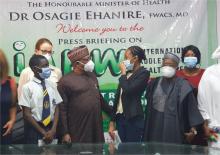Stakeholders call for more investment in adolescent health and well-being
Abuja, 31 March 2021 - “We should be recognized while making health decisions and not all should be made for us especially the girl child. The government should create more youth friendly centres where youths can feel free to discuss issues regarding their health, this will help the youth not to go into depression, if they have place where they can let out their agitations and have competent counselors to attend to them”, Isabel Anani a teenager and representative of Stand With A Girl Initiative said.
Ms Anani made the remark while appreciating the government and development partners at an event to commemorate the 2021 International Adolescent Health Week.
She however urged the Federal Ministry of Health (FMOH) to create a specialized desk for adolescents in all major public health facilities where they can seek medical and psychological care especially during this time of the COVID-19 pandemic.
To mark the 2021 International Adolescent Health Week, the Minister of Health, Dr Osagie Ehanire, reiterated the Federal Government’s commitment towards ensuring the welfare of adolescents in Nigeria saying that, “the COVID-19 pandemic has brought to the forefront, the importance of health investment in childhood towards a healthy adulthood”.
The minister interacted with the adolescents at both physical and virtual events convened in Abuja on 23 March 2020 to commemorate the International Adolescent Health Week.
Speaking to the adolescents and journalists present at the physical event, Dr Ehanire indicated that the government recognizes the potential and importance of investing in the health and wellbeing of adolescents to support a successful transition to adulthood.
He pointed out that the leading health challenges among adolescents and young people in Nigeria, based on a report of a situation analysis conducted by the Federal Ministry of Health 2019, include issues of; Sexual and Reproductive Health and Rights (SRH), mental health, substance abuse, nutritional problems, violence and injuries, physical disorders and chronic conditions such as asthma, sickle cell disease disorders, and oral health problems, including communicable and other non-communicable diseases.
“Moreover, the COVID-19 pandemic has directly and indirectly affected adolescents with long term morbidity and mortality; limited access to essential services, including SRH services; increased risk of gender-based violence (GBV) and harmful practices, with attendant psychological consequences perpetuated by negative masculine gender roles”, the minister said.
He, however, assured Nigerians that the FMOH is providing leadership and guidance, in collaboration with Partners, to ensure continuous delivery of essential gender-responsive services and to mitigate health services access barriers faced by adolescents and young people in Nigeria.
According to the World Health Organization (WHO), making progress on Universal Health Coverage requires keeping adolescents at the centre of the Sustainable Development Goal agenda which represents a critical window of opportunity for effective prevention and health promotion with effects throughout the life-course.
With the vision that “no adolescent or young person is left behind”, WHO is continuing to work with Government at all levels to support specific actions that effectively respond to the needs of different categories of adolescents and young people with various levels of vulnerabilities and to remove barriers constraining the access of any subgroup to relevant services and opportunities for improved health, well-being, and development.
Equally, WHO Nigeria, under the organization’s Adolescent flagship program, has been supporting the FMOH, using the global Accelerated Action on Health Adolescent Guidance, to revise the National policy on health and development of Adolescent and young people. WHO is also supporting the follow-on National implementation plan plus the Monitoring and evaluation Framework being developed.
At the subnational level, WHO is supporting the operationalization of the implementation plan in two LGAs (Edo-ore and Daura) in two states (Edo and Katsina) respectively. In addition, technical support in the disaggregation of Adolescent health data in the HMIS was facilitated by WHO.
The International Adolescent Health Week is celebrated yearly on the third full week in March. It is aimed at celebrating young people with the goal of working collectively towards improving the health and well-being of adolescents across the world. The theme for this year’s theme is, Adolescent Resilience in the Face of a Pandemic”. It resonates the tremendous resilience and adaptability of adolescents, despite the challenges and uncertainties they have faced as a result of the COVID-19 pandemic.
Technical Contacts:
Dr Boateng Koffi; Email: boatengko [at] who.int; Tel: +234 706 449 1772
Dr Joy Ufere; Email: uferej [at] who.int; Tel: ++234 803 979 5143




